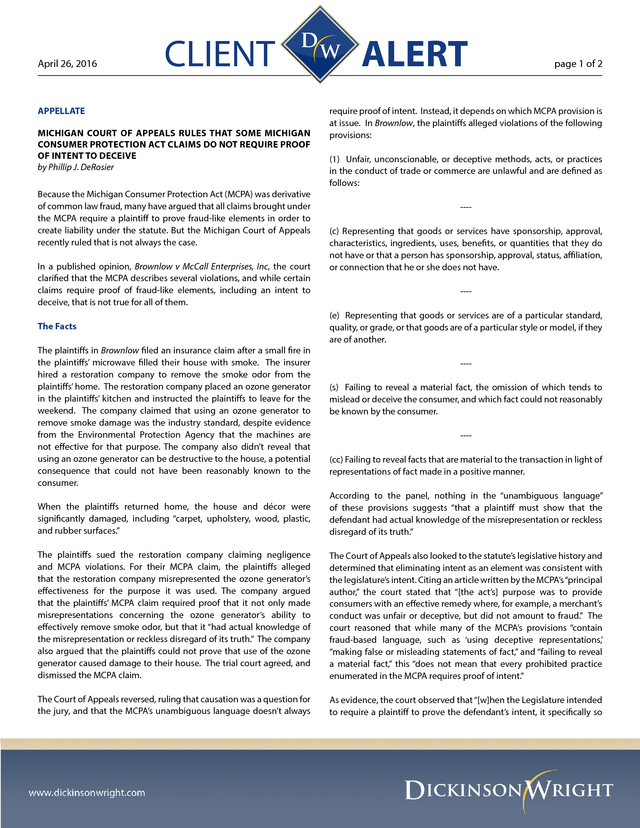Michigan Consumer Protection Act Claims Do Not Require Proof of Intent to Deceive - April 26, 2016
Dickinson Wright
Description
April 26, 2016
CLIENT
APPELLATE
MICHIGAN COURT OF APPEALS RULES THAT SOME MICHIGAN
CONSUMER PROTECTION ACT CLAIMS DO NOT REQUIRE PROOF
OF INTENT TO DECEIVE
by Phillip J. DeRosier
Because the Michigan Consumer Protection Act (MCPA) was derivative
of common law fraud, many have argued that all claims brought under
the MCPA require a plaintiff to prove fraud-like elements in order to
create liability under the statute. But the Michigan Court of Appeals
recently ruled that is not always the case.
In a published opinion, Brownlow v McCall Enterprises, Inc, the court
clarified that the MCPA describes several violations, and while certain
claims require proof of fraud-like elements, including an intent to
deceive, that is not true for all of them.
The Facts
The plaintiffs in Brownlow filed an insurance claim after a small fire in
the plaintiffs’ microwave filled their house with smoke. The insurer
hired a restoration company to remove the smoke odor from the
plaintiffs’ home.
The restoration company placed an ozone generator in the plaintiffs’ kitchen and instructed the plaintiffs to leave for the weekend. The company claimed that using an ozone generator to remove smoke damage was the industry standard, despite evidence from the Environmental Protection Agency that the machines are not effective for that purpose. The company also didn’t reveal that using an ozone generator can be destructive to the house, a potential consequence that could not have been reasonably known to the consumer. When the plaintiffs returned home, the house and décor were significantly damaged, including “carpet, upholstery, wood, plastic, and rubber surfaces.” The plaintiffs sued the restoration company claiming negligence and MCPA violations.
For their MCPA claim, the plaintiffs alleged that the restoration company misrepresented the ozone generator’s effectiveness for the purpose it was used. The company argued that the plaintiffs’ MCPA claim required proof that it not only made misrepresentations concerning the ozone generator’s ability to effectively remove smoke odor, but that it “had actual knowledge of the misrepresentation or reckless disregard of its truth.” The company also argued that the plaintiffs could not prove that use of the ozone generator caused damage to their house. The trial court agreed, and dismissed the MCPA claim. The Court of Appeals reversed, ruling that causation was a question for the jury, and that the MCPA’s unambiguous language doesn’t always ALERT page 1 of 2 require proof of intent.
Instead, it depends on which MCPA provision is at issue. In Brownlow, the plaintiffs alleged violations of the following provisions: (1) Unfair, unconscionable, or deceptive methods, acts, or practices in the conduct of trade or commerce are unlawful and are defined as follows: ---(c) Representing that goods or services have sponsorship, approval, characteristics, ingredients, uses, benefits, or quantities that they do not have or that a person has sponsorship, approval, status, affiliation, or connection that he or she does not have. ---(e) Representing that goods or services are of a particular standard, quality, or grade, or that goods are of a particular style or model, if they are of another. ---(s) Failing to reveal a material fact, the omission of which tends to mislead or deceive the consumer, and which fact could not reasonably be known by the consumer. ---(cc) Failing to reveal facts that are material to the transaction in light of representations of fact made in a positive manner. According to the panel, nothing in the “unambiguous language” of these provisions suggests “that a plaintiff must show that the defendant had actual knowledge of the misrepresentation or reckless disregard of its truth.” The Court of Appeals also looked to the statute’s legislative history and determined that eliminating intent as an element was consistent with the legislature’s intent. Citing an article written by the MCPA’s “principal author,” the court stated that “[the act’s] purpose was to provide consumers with an effective remedy where, for example, a merchant’s conduct was unfair or deceptive, but did not amount to fraud.” The court reasoned that while many of the MCPA’s provisions “contain fraud-based language, such as ‘using deceptive representations,’ “making false or misleading statements of fact,” and “failing to reveal a material fact,” this “does not mean that every prohibited practice enumerated in the MCPA requires proof of intent.” As evidence, the court observed that “[w]hen the Legislature intended to require a plaintiff to prove the defendant’s intent, it specifically so .
April 26, 2016 CLIENT provided in the statute,” citing two provisions that specifically included the words “with intent” when describing the violation. Until the Brownlow decision, the extent to which the MCPA was to be construed with reference to the elements of common-law fraud was unclear. While it remains to be seen whether the Brownlow decision is appealed to the Michigan Supreme Court, it provides clarification in an area that has received little attention from Michigan courts. This client alert is published by Dickinson Wright PLLC to inform our clients and friends of important developments in the field of appellate law. The content is informational only and does not constitute legal or professional advice. We encourage you to consult a Dickinson Wright attorney if you have specific questions or concerns relating to any of the topics covered in here. FOR MORE INFORMATION CONTACT: Philip J.
DeRosier is a Member in Dickinson Wright’s Detroit office. He can be reached at 313.223.3866 or pderosier@dickinsonwright.com ALERT page 2 of 2 .
The restoration company placed an ozone generator in the plaintiffs’ kitchen and instructed the plaintiffs to leave for the weekend. The company claimed that using an ozone generator to remove smoke damage was the industry standard, despite evidence from the Environmental Protection Agency that the machines are not effective for that purpose. The company also didn’t reveal that using an ozone generator can be destructive to the house, a potential consequence that could not have been reasonably known to the consumer. When the plaintiffs returned home, the house and décor were significantly damaged, including “carpet, upholstery, wood, plastic, and rubber surfaces.” The plaintiffs sued the restoration company claiming negligence and MCPA violations.
For their MCPA claim, the plaintiffs alleged that the restoration company misrepresented the ozone generator’s effectiveness for the purpose it was used. The company argued that the plaintiffs’ MCPA claim required proof that it not only made misrepresentations concerning the ozone generator’s ability to effectively remove smoke odor, but that it “had actual knowledge of the misrepresentation or reckless disregard of its truth.” The company also argued that the plaintiffs could not prove that use of the ozone generator caused damage to their house. The trial court agreed, and dismissed the MCPA claim. The Court of Appeals reversed, ruling that causation was a question for the jury, and that the MCPA’s unambiguous language doesn’t always ALERT page 1 of 2 require proof of intent.
Instead, it depends on which MCPA provision is at issue. In Brownlow, the plaintiffs alleged violations of the following provisions: (1) Unfair, unconscionable, or deceptive methods, acts, or practices in the conduct of trade or commerce are unlawful and are defined as follows: ---(c) Representing that goods or services have sponsorship, approval, characteristics, ingredients, uses, benefits, or quantities that they do not have or that a person has sponsorship, approval, status, affiliation, or connection that he or she does not have. ---(e) Representing that goods or services are of a particular standard, quality, or grade, or that goods are of a particular style or model, if they are of another. ---(s) Failing to reveal a material fact, the omission of which tends to mislead or deceive the consumer, and which fact could not reasonably be known by the consumer. ---(cc) Failing to reveal facts that are material to the transaction in light of representations of fact made in a positive manner. According to the panel, nothing in the “unambiguous language” of these provisions suggests “that a plaintiff must show that the defendant had actual knowledge of the misrepresentation or reckless disregard of its truth.” The Court of Appeals also looked to the statute’s legislative history and determined that eliminating intent as an element was consistent with the legislature’s intent. Citing an article written by the MCPA’s “principal author,” the court stated that “[the act’s] purpose was to provide consumers with an effective remedy where, for example, a merchant’s conduct was unfair or deceptive, but did not amount to fraud.” The court reasoned that while many of the MCPA’s provisions “contain fraud-based language, such as ‘using deceptive representations,’ “making false or misleading statements of fact,” and “failing to reveal a material fact,” this “does not mean that every prohibited practice enumerated in the MCPA requires proof of intent.” As evidence, the court observed that “[w]hen the Legislature intended to require a plaintiff to prove the defendant’s intent, it specifically so .
April 26, 2016 CLIENT provided in the statute,” citing two provisions that specifically included the words “with intent” when describing the violation. Until the Brownlow decision, the extent to which the MCPA was to be construed with reference to the elements of common-law fraud was unclear. While it remains to be seen whether the Brownlow decision is appealed to the Michigan Supreme Court, it provides clarification in an area that has received little attention from Michigan courts. This client alert is published by Dickinson Wright PLLC to inform our clients and friends of important developments in the field of appellate law. The content is informational only and does not constitute legal or professional advice. We encourage you to consult a Dickinson Wright attorney if you have specific questions or concerns relating to any of the topics covered in here. FOR MORE INFORMATION CONTACT: Philip J.
DeRosier is a Member in Dickinson Wright’s Detroit office. He can be reached at 313.223.3866 or pderosier@dickinsonwright.com ALERT page 2 of 2 .













